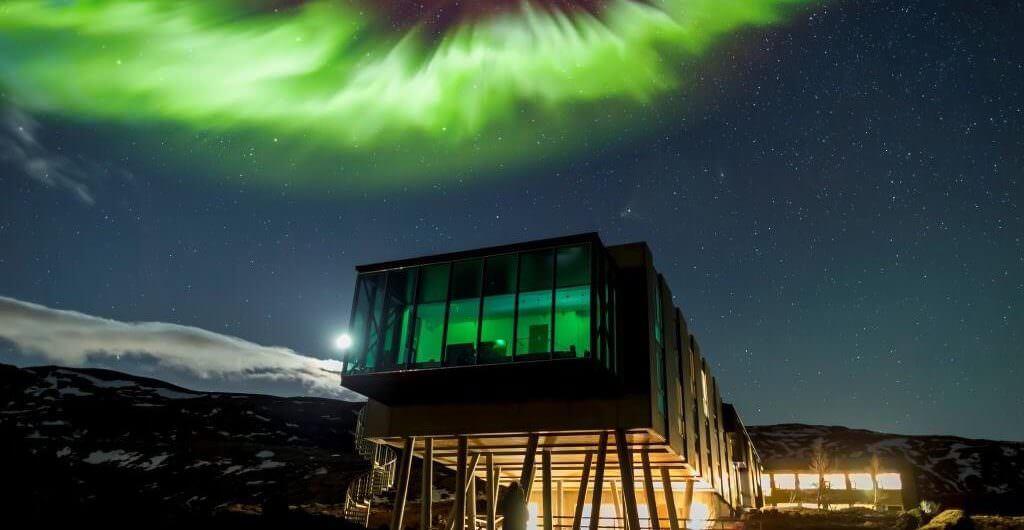Iceland’s tourist season is concentrated from mid-June through August, and tourism is growing by about 10% each year; so booking ahead is often essential. Prices fall as much as 40% in the off season, but many accommodations close in winter, especially guesthouses.
Iceland is not the poor and provincial country it once was, and virtually all accommodations meet good basic standards of comfort and cleanliness. Mattress standards are particularly high.
Accommodation Options
Hotels – The word “hotel” generally signifies the most luxurious choice in town, but not all hotels are superior to or more expensive than guesthouses, and not all “hotel” rooms even have private bathrooms.
Guesthouses – are a time-honored Scandinavian institution that is closely related to the “bed-and-breakfast.” Rooms, which are usually in private houses, are most often cheaper than hotels and range in quality from the equivalent of a two-star hotel to a hostel. While private bathrooms are rare, most guesthouses are likely to have cooking facilities, sleeping-bag accommodation, or a family-size apartment fitting four to six people. Because Icelanders have a highly developed sense of personal privacy, the proprietors often live in a separate house. Standards of cleanliness are usually very high.
Cabins – Small timber cabins for travelers are sprouting up all over Iceland, usually in conjunction with an existing hotel or guesthouse. Some travelers seek them out for their comparative privacy, quiet, and convenience. The cabins are often designed for family groups of around four, with private bathrooms and cooking facilities. Prices are comparable to regular doubles.
Farm Holidays – Staying at farmhouses is the classic Icelandic way to travel, and helps visitors feel more in tune with Iceland’s cultural traditions. Every farm in Iceland has its own road sign, and farm names are often unchanged from the Age of Settlement. Towns and villages did not exist for most of Icelandic history, so farmsteads have traditionally been the organizational basis of Icelandic society. A farm stay is simply a guesthouse in farm surroundings; expect comforts to be on par with those of a European bed-and-breakfast.
Sleeping-Bag Accommodation – For hardy visitors on a budget, the Icelandic custom of “sleeping-bag accommodation,” can feel like a gift from the travel gods. In many guesthouses, farm stays, and even some hotels, travelers with their own sleeping bags can get around 35% to 50% off on room rates.
The Case for Hostels — Iceland’s 25 youth hostels are hardly the exclusive domain of young backpackers. All hostels have good basic standards of service and cleanliness. Some are almost indistinguishable from guesthouses or farm stays. Most offer doubles, though the majority of rooms sleep three to six; and private bathrooms are an extreme rarity. All hostels give you the option of sleeping-bag accommodation or sheet rental. All have guest kitchens, and some offer meals and self-service laundry. In some remote destinations in Iceland, hostels may be your only option for lodging and dining, as well as an excellent source of tourist information.
Camping – Iceland’s many campsites make the country far more accessible to travelers of limited means. Icelandic campsites are safe, conveniently located, and plentiful: virtually every village has one. Many campsites are adjoined to farm accommodations, even to guesthouses or hotels, not to mention all the hiking trails. Because Icelanders themselves love to camp, campsites can also be great places to meet natives.
The Star-Rating System
Icelandic hotels are rated on a voluntary basis by the government on a one- to five-star scale. One star means breakfast is available and your room has a sink, among other minimum standards. Two stars means more options for meals and refreshments. Three stars means all rooms have private bathrooms, phones, TVs, radios, and desks. Four stars means easy chairs, satellite channels, room service, and laundry service. Five stars means room safes, secretarial services, exercise facilities, and shops — but not a single Icelandic hotel has earned this designation.
Many fine hotels and guesthouses opt out of the rating system, however, because the standardized criteria do not serve them well. A hotel in an old house, for instance, could be demoted a star if just one of its rooms lacks the requisite square footage. Accommodations with individualized room designs are particularly ill-served by the system.
More Money-Saving Tips
- Book rooms with access to a kitchen. Restaurants are particularly expensive in Iceland, and you can save money by cooking for yourself.
- Ask about apartments and “family rooms” if you are traveling in a group of three or more. These types of rooms are very common in Iceland, but are not always well-advertised.
- Act noncommittal. Many Icelandic guesthouses quote different prices to different people. Always ask for a price before committing, even if the guesthouse has a published rate. They could quote something lower to snag your business.
- Be wary of packages and group tour rates. Icelandic guesthouses often quote a higher rate to a travel agent than to an individual calling directly, especially outside of Reykjavik.
- Ask about special rates or other discounts. You may qualify for corporate, student, military, senior, frequent flier, trade union, or other discounts. Children’s discounts are very common in Iceland.
- Book online. Internet-only discounts are very common in Iceland; many accommodations have a standard discount every time you book online. Some supply rooms to Priceline, Hotwire, or Expedia at rates lower than the ones you can get through the hotel itself.
- Remember the law of supply and demand. You can save big on hotel rooms by traveling in Iceland’s off season or shoulder seasons, when rates typically drop, even at luxury properties.

